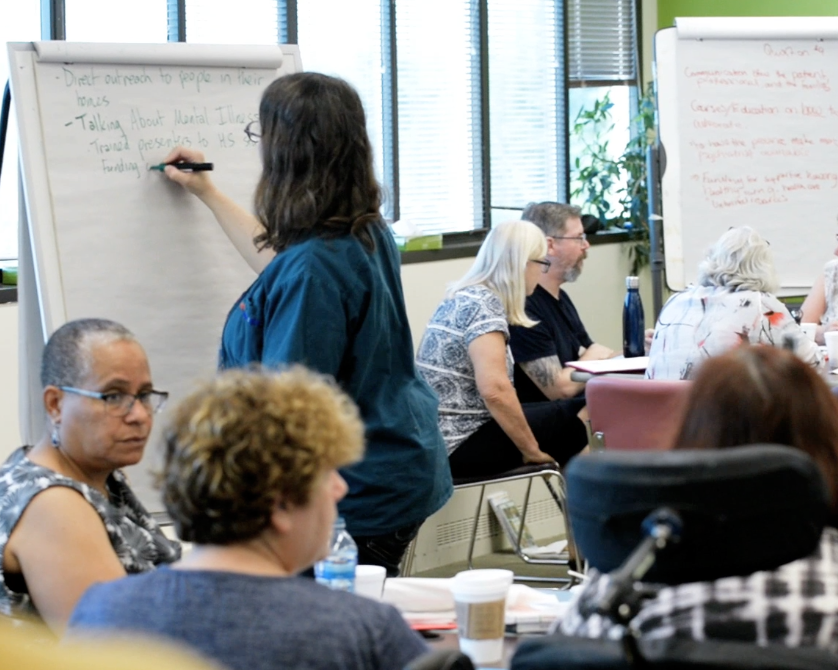Rethinking family caregiving: Q&A with Charmaine Williams, director of the Family Caregiving Project
Categories: Charmaine Williams, Faculty, Q & A, Research
The Family Caregiving Project, led by Professor Charmaine Williams, is a multi-year research study exploring the experiences of families across Ontario affected by mental illness. In honour of Mental Health Week, May 2-8, we sat down with Williams (who also happens to be interim dean of the Factor-Inwentash Faculty of Social Work) to learn more about this initiative and how it aims to improve care for families.
 What inspired the Family Caregiving Project and what are the Project’s goals?
What inspired the Family Caregiving Project and what are the Project’s goals?
The plan for this project emerged out of encounters with families who were struggling to navigate the challenges associated with mental illness. All too often, the mental health care system engages with individuals and caregivers separately but has little to offer families as a whole. Existing mental health research also rarely considers the diversity of family forms, which can include those who are not biologically or legally related. The Family Caregiving Project aims to change this.
How do you aim to realize this change?
There were three distinct phases of the project: a series of events called “Family Mental Health Cafés,” an online survey, and in-depth interviews with families. The knowledge we have gained from each phase has informed the creation of extensive training resources and tools — including power point presentations, discussion guides, videos, online lessons, reports and reading list — that can be used both by those working within the mental health care system and family members themselves. An example is a facilitators’ toolkit, which we developed to help service providers and community leaders conduct their own Family Mental Health Cafés to support families affected by mental illness.
By engaging professionals and making the findings of our research widely available to all, we hope to make it easier for family members, including all the people who are considered family, to advocate for the care that they need. The next step will be to advocate for changes in policy as well. We are also hoping the outputs from this project contribute to public education that will make our communities more supportive for families affected by mental illness.
How do you define ‘family’ in the context of your project?
Many of us are connected to people who we care for and who care for us, but their importance may not be recognized because of the way society defines family. In our project, family is defined by the people within it, based on their feelings of connection to each other, and their expectation that they will care for each other over the long term, based on that connection. Families come in many forms and can be created in many ways. Taking this expanded and more inclusive idea of family is vital to respecting the values and realities of the families we serve.
How do issues of justice and equity impact family caregiving?
One of the most profounding social justice issues faced by families affected by mental illness is stigma against mental illness, and how that translates into social isolation, negative encounters, and under-resourcing of mental health supports and services. In addition, families navigate healthcare and other systems while navigating stressors like racism, homophobia, classism, and other forms of oppression and discrimination that can contribute to harmful and aversive personal, social and institutional experiences. Families that are members of marginalized, disadvantaged, or stigmatized groups also face additional challenges and barriers to getting help and support.
It is important to recognize that there is no one model of effective family caregiving. The models of family and caregiving that inform our policies, services and practices may not translate well to many cultures. At the extreme, Western value systems can create barriers, increase stigma, and contribute to the harm that marginalized and equity-deserving families experience as they try to access support and services. These are all things that need to be taken into consideration when we are working with families.
In what other ways does your project challenge the traditional or mainstream approach to family care?
For many years, the concept of “family burden” dominated the way we thought about issues faced by caregiving families. This means that those who are living with mental illness are usually identified as a source of stress and burden for family members. In this framing, the person who is living with a mental illness is not seen as a functioning, contributing part of the family system, a characterization that is disempowering and stigmatizing for those individuals.
It is true that when any family member is experiencing a period of acute illness, there is stress, dependence, and a need to devote additional caring resources to that individual. However, it is problematic that most of the work on caregiving and mental illness assumes that diagnosed individuals are always stressing, dependent and a drain on caring resources in the family.
This project’s insistence on naming caregiving families as whole family systems managing the care, needs, resources and interdependence of all family members is a strategy to shift the way we think about these families and advocate for their support and empowerment as whole families.
You talk about the family as a system. Could you tell us more about that?
All social workers learn about system theory and its applications to individuals, families, communities, and institutions. It is helpful to think about a family as a system: a group of individuals who, together, develop shared functions, identities, histories, and cultures. Individuals within the family play different roles in maintaining the family system, and there is a division between the family system and other individuals or groups that surround it.
Family systems are always in states of change, affected by internal and external factors. Internal influences can include the addition or loss of family members, maturing of family members, or new stressors on individuals in the family. External influences can include changing social conditions, contacts with other families, or interactions with institutions like schools, religious organizations, or government agencies. Both internal and external influences affect everyone within the family system, but family members work together to maintain stability as a system through such change. This project emphasizes that individuals diagnosed with mental illness are not just stressors on the family system; they are part of the family system.
We’ve discussed how families are defined, issues of justice and equity, and the family as a system. How can the healthcare system adjust to meet the needs of families with all of this in mind?
Our research has made it clear that a focus on family mental health needs to include attention not only to the well-being of the person with a diagnosed mental illness, but also the well-being of other family members and the well-being of the entire family system. Instead of assuming what a particular family should do, we suggest that the more important focus for work with a family is whether the family system functions in a way that promotes the safety, security, and well-being of those within it. Healthcare systems must actively work to remove existing barriers that make some families less likely to seek care or make it difficult for them to receive care. We must also do more to increase the awareness of how systemic inequities create additional challenges for family experiences of mental illness and find ways to address those inequities.
What is your vision for the future of family-focused policy and programming?
Healthcare policy needs to reflect the diverse ways that people create families. Current policies are built on assumptions that one person is always a caregiver and another person is always a care receiver. Social attitudes and healthcare services all need updating to reflect modern, destigmatizing views of mental health and the caregiving experiences across different family forms and diverse cultures. Policies also need to reflect the fact that needs change as families change. Responsive policies would recognize the changing roles within the family system. Policies should be created to support the family system instead of just individual caregivers and dependents.
What’s next for the Family Caregiving Project?
I am proud to report that videos and education materials created by the Family Caregiving Project are now actively being used in classrooms. We are also now working on academic publications and presentations, and we will be releasing an end-of-project report for participants, stakeholders, and members of the public in the spring. Our focus moving forward will be to continue developing resources for families and engage in knowledge mobilization to inspire healthcare system change.
Related:
- The Family Caregiving Project shares online resources to improve mental health care for families
- New video series from the family caregiving project provides insight into how families navigate mental illness